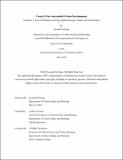Visual AI for Sustainable Urban Development Computer Vision and Machine Learning Applications for Climate and Social Impact
Author(s)
Schrage, Leonard
DownloadThesis PDF (4.450Mb)
Advisor
Sevtsuk, Andres
Terms of use
Metadata
Show full item recordAbstract
The surge in interest in Artificial Intelligence (AI)—driven by recent advancements—has sparked widespread discourse across various sectors, reflecting mixed reactions of fascination and concern. This thesis focuses on Visual AI, critically analysing the technology’s potential to promote sustainable urban development. Presenting and evaluating three case studies that employ computer vision and machine learning in urban planning contexts, the research highlights the potential of Visual AI in enhancing urban complexity understanding and decision-making to mitigate the built environment’s immense carbon footprint and social shortcomings, whilst cautioning against the technology's ability to exacerbate current urban development issues. The projects—Urban Ingredients, City Aesthetics, and Million Neighborhoods: Reblocking—demonstrate three different approaches to using Visual AI for climate and social impact. The case studies subjects include generating global material stock data, analysing the correlation between facade geometries and urban health, and the scaling of parcel data generation for informal settlements. The thesis reflects on the limitations, impacts, and risks of the presented projects and offers a vision for future research aimed at achieving circular, regenerative, and equitable urban environments at scale.
Keywords
Visual Computing, Artificial Intelligence, Computer Vision, Machine Learning, AI Ethics, Urban Science, Climate Change, Equitable Cities, Urban Mining, Circular Economy, Architectural Neuroaesthetics, Facade Patterns, Parcelization, Reblocking, Informal Settlements
Date issued
2024-05Department
Massachusetts Institute of Technology. Department of Urban Studies and PlanningPublisher
Massachusetts Institute of Technology